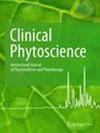加纳一些药用植物的体外抗增殖活性
引用次数: 0
摘要
癌症发病率和死亡率居高不下,继续对人类福祉构成重大威胁。因此,寻找更新、更有效、更安全的抗癌药物变得更加重要。多年来,加纳一直使用一些药用植物来治疗异常组织增生(肿瘤)。尽管有大量文献指出,人们在使用这些药用植物时发现了一些缓解症状的方法,但有关其抗增生活性的科学证据却很有限。从七种植物的九种药用植物材料中提取乙醇萃取物,这些植物包括:Terminalia superba、Talbotiella gentii 和 Ceiba pentandra 的茎皮,以及 Morinda lucida、Dracaena arborea、Dioscorea dumetorum、Thaumatococcus danielli、Talbotiella gentii 和 Ceiba pentandra 的叶子、采用 MTT 法评估了 Ceiba pentandra 和 Talbotiella gentii 对四种人类癌细胞株(肝细胞癌、结直肠腺癌、宫颈癌和乳腺腺癌)的抗增殖活性。五加科植物叶片的提取物普遍具有较高的抗增殖活性,尤其是对人肝癌(HepG2)细胞(IC50 = 16.3 µg/mL)和人结直肠腺癌(RKO)细胞(IC50 = 18.7 µg/mL)的抗增殖活性更强。所有其他植物材料对四种癌细胞系均表现出弱(IC50:201-500 µg/mL)至中等(IC50:21-200 µg/mL)的抗增殖活性。植物材料的提取物表现出不同的抗增殖活性。五加科植物叶片的提取物表现出最高的抗增殖活性。五角枫叶的 IC50 值达到了对 HepG2 和 RKO 癌细胞株有效的基准。因此,有必要进一步对五角枫叶进行分馏工作。今后还可以探索五角枫叶提取物对其他癌细胞系和正常细胞系的抗增殖作用,以确定这种植物材料的抗癌潜力。总之,这项工作的研究结果支持在加纳本地使用这些植物材料治疗异常组织生长。本文章由计算机程序翻译,如有差异,请以英文原文为准。
In vitro antiproliferative activities of some Ghanaian medicinal plants
Cancer continues to pose a significant threat to human well-being due to the overwhelming rate of morbidity and mortality associated with it. Hence, the quest for newer, effective and safer anticancer agents has become more crucial. Over the years, some medicinal plants have been used to treat abnormal tissue growths (tumours) in Ghana. Even though sufficient literature points out that people found some relief in their use, there is limited scientific evidence of their antiproliferative activities. Ethanolic extracts of nine medicinal plant materials from seven plant species, including the stem bark of Terminalia superba, Talbotiella gentii and Ceiba pentandra and the leaves of Morinda lucida, Dracaena arborea, Dioscorea dumetorum, Thaumatococcus danielli, Ceiba pentandra and Talbotiella gentii, were evaluated for antiproliferative activities against four human cancer cell lines (hepatocellular carcinoma, colorectal adenocarcinoma, cervical carcinoma, and mammary adenocarcinoma) using an MTT-based assay. The extract of C. pentandra leaves, exhibited generally higher antiproliferative activity, which was particularly substantial against human hepatocellular carcinoma (HepG2) cells (IC50 = 16.3 µg/mL) and human colorectal adenocarcinoma (RKO) cells (IC50 = 18.7 µg/mL). All the other plant materials demonstrated weak (IC50: 201–500 µg/mL) to moderate (IC50: 21–200 µg/mL) antiproliferative activities against the four cancer cell lines. The extracts of the plant materials demonstrated varied antiproliferative activities. Extract of C. pentandra leaves exhibited the highest antiproliferative activity. The IC50 values of C. pentandra leaves met the benchmark to be considered effective against HepG2 and RKO cancer cell lines in particular. Therefore, there is the need to further undertake fractionation work on C. pentandra leaves. The antiproliferative effect of extract of C. pentandra leaves against other cancer cell lines and normal cell line could also be explored in the future to ascertain the anticancer potential of this plant material. Generally, findings from this work support the indigenous use of these plant materials in treating abnormal tissue growth in Ghana.
求助全文
通过发布文献求助,成功后即可免费获取论文全文。
去求助
来源期刊
自引率
0.00%
发文量
18
审稿时长
13 weeks
期刊介绍:
Clinical Phytoscience is an international, peer-reviewed, interdisciplinary, and open access journal publishing high quality research articles on clinical evidence and use of medicinal plants in the development of efficient and well tolerated phytotherapy. Clinical Phytoscience focuses on phytotherapy, looking at proof of concept, efficacy and safety, to be established “at eye level” compared to pharmacotherapy. The emphasis lies on application oriented topics (efficacy and safety of phytotherapy in a specific indication, including its need and acceptance by the patient). The scientific results published in the journal should contribute to the recovery and maintenance of human health by phytotherapy. Clinical Phytoscience will publish high-quality evidence-based clinical studies and relevant pharmacological studies. Key areas of interest are: -Upper and lower airways, ENT and pneumology -Gynecology -Urology -Nephrology Pediatrics -Intestinal tract -Hepatology -Diabetes/metabolic Syndrome -Immunology and microbiology -Hygiene -Analytics

 求助内容:
求助内容: 应助结果提醒方式:
应助结果提醒方式:


